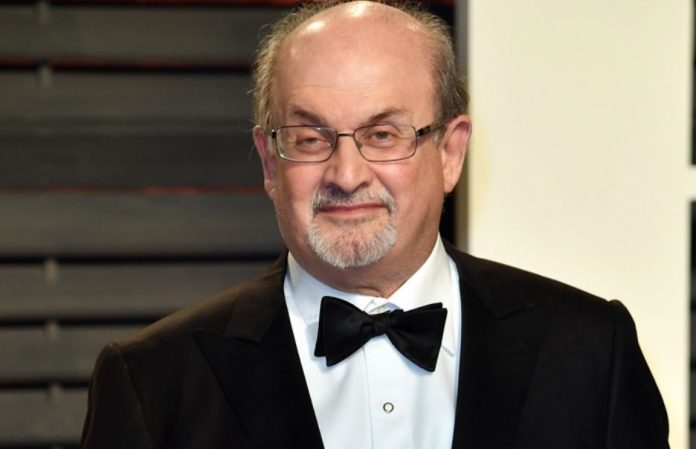By Kenneth Tiven
Two days after being attacked, the full extent of injuries to novelist Salman
Rushdie, knifed repeatedly on Friday by an assailant, are serious, but how serious or how long his hospitalisation, doctors will not say.
He was taken off ventilator, hours after the surgery. He was now able to talk, said his agent Andrew Wylie. He was knifed several times, including in the neck, arm and abdomen. Wylie said his liver had been damaged and he was likely to
lose an eye.
During an arraignment for 24-year-old Hadi Matar, accused of carrying out
the attack, the charges were attempted murder and assault. Prosecutors
said Rushdie was stabbed roughly 10 times as he prepared to speak at the
Chautauqua Institution in western New York on Friday.
The author’s 1988 novel The Satanic Verses was controversial, especially in
Iran where the Ayatollah Ruhollah Khomeini issued in 1989 a fatwa calling
for his death. The book fictionalized parts of the life of the Prophet Muhammad with depictions that offended some Muslims, who believed the novel to be blasphemous.
The Iranian government has since sought to distance itself from the fatwa, but the price on Rushdie’s head had increased in recent years to more than three million dollars. In Iran, Tehran government-controlled media rejoiced. Newspaper Keyhan described the attack as ‘divine vengeance’.
The front page of Keyhan, a newspaper published in Tehran, on Sunday said that Mr. Rushdie had gotten ‘divine vengeance,’ suggesting that former
President Donald J. Trump and Mike Pompeo, his former secretary of state,
‘are next’.
The assault was captured on video and the audience of hundreds watched in
horror. Hadi Matar fought violently with the people trying to get him off of
Rushdie, injuring at least one of them. Any chance that the American born
son of Lebanese parents personally collects any money from the Iranians is
slim.
Security at the Chautauqua Institution is minimal. At its main amphitheater,
which regularly hosts popular musical acts and celebrity speakers and
where Mr. Rushdie was scheduled to speak, there are no bag checks or
metal detectors.
A crowd of people immediately rushed to where the author lay on the
stage to offer aid. Stunned members of the audience were screaming,
others got up and moved slowly toward the stage. A person could be heard
yelling “Oh, my God” repeatedly.
Paul Susko sat with his son in the front row on the side of the stage where
Matar rushed at the author. He described the lack of security: “There was
screening to prevent attendees from bringing in a cup of coffee. Maybe
screening for weapons for walk-through metal detectors would have been
more helpful. There was no security stopping us from getting to the stage.
There was zero security visible around the stage at the time of the attack.”
A sheriff’s deputy and another officer with a dog ran to the scene about a minute later, arresting Matar. Hours after the attack, the institution’s president, Michael Hill, said the site had seen nothing like it in almost 150 years of existence.
He said: “We were founded to bring people together in community, to learn
and in doing to create solutions, to develop empathy and to take on intractable problems. Today, we are called to take on fear and the worst of
all human traits: hate.” Hill confirmed Matar had a ticket for the event “the
same way any other patron would have”.
He stressed that the institution
was open to anyone, as part of its mission of inclusivity. Asked whether
there should have been beefed-up security with metal detectors present,
given the sensitivities around Rushdie, he said: “We are proud of the security we have.”
Recently, Rushdie was interviewed by German news magazine Stern about his safety. Rushdie, who spent several years in virtual hiding, said his life would have been in a lot more danger if social media had been around
when the Satanic Verses was written in the late 1980s.
“A fatwa is a serious thing. Luckily we didn’t have the internet back then.
The Iranians had send the fatwa to the mosques by fax. That’s all a long
time ago. Nowadays my life is very normal again.” Asked about current
fears, Rushdie said: “In the past I would have said religious fanaticism. The
biggest danger facing us right now is that we lose our democracy. Today’s
greatest danger facing us is this kind of cryptofascism that we see in
America and elsewhere…I always tell people don’t be afraid. But the bad
thing is that death threats have become more normal. Look at how many
guns there are in America. I think a lot of people today live with similar
threats to the ones I had back then. And the fax machines they used
against me is like a bicycle rather than a Ferrari compared with the
internet.”
Stern asked what his advice was for people scared of where the world is
heading: “I believe something very good is happening in the young generation: it is much more inclined to activism. We are seeing a generation grow of age that we urgently need right now, a combative one.
We need people who can organize themselves, people who are prepared to
fight, for a society worth living in. Instead of hoping things turn out for the best. As an author, I also notice that young authors are becoming role models again – instead of the way it used to be, namely just the dead ones.” He said he was happy his books were being reviewed on arts pages, rather than in the political sections of the newspapers.
Reality today is that Rushdie’s near death experience is front page news in print and on websites globally.


